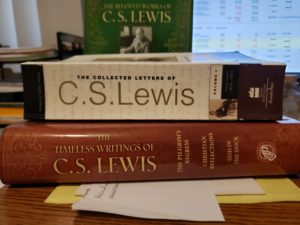
As I write this, I’m nearing the end of two books I’m reading, and am about halfway through a book I’m re-reading. It won’t be long before I’m ready to choose something else to read. But what will it be?
The books I’m just about finishing are:
- Jews, God and History by Mix I. Dimont; down to the last 20 pages
- Savage Beauty: The Life of Edna St. Vincent Millay by Nancy Milford; about 120 pages to go in this 610 page book
The book I’m re-reading is:
- The Inklings of Oxford: C.S. Lewis, J.R.R. Tolkien, and Their Friends by Harry Lee Poe and James Ray Veneman; 60 pages into this 102 page book, reading on my smart phone.

So, again I ask myself, what’s next? I should shift to fiction, as most of my reading this year, or maybe all of it, has been non-fiction. I’d like to get back to the Dune series by Frank Herbert. Alas, I don’t have the next one in the series and I’d really like to read them in order. I should just bit the bullet and order it on my Amazon gift card or go to Barnes & Noble and buy it. I have so many books already in the house, though, I hate to bring another book in.
Other fiction I could read is try to get through some of JRR Tolkien’s works. I read the first book of The Lord Of The Rings, but struggled with it and am not anxious to try again. I also have the prequel to that, The Silmarillion, but, again, I find Tolkien hard to get through.
If I stick with non-fiction, I have a number of things to choose from. For one, I should really finish The Federalist Papers. I spot-read this as research for Documenting America: Making The Constitution Edition. The last few I read held my interest, so I’m thinking I should try it again and get it read. That’s a major commitment due to length, so I don’t know.
I should also go back and re-read some of John Locke’s Treatises on Government, since I read them in a distracted, less-than-optimal state. Or, I should read some of the things he referenced. It’s quite possible that the next book I write in the Documenting America series will be Run-up to Revolution, in which case I need to be reading what the Founders were reading. That’s research, however, and I’m really thinking of pleasure reading.
If I were to shift to poetry, I should read some of Edna St. Vincent Millay’s poems. I have two compilations of hers. Or, I should get back to Robert Frost or Wallace Stevens, both of whom I started reading but didn’t finish. But, I’m not sure I’m ready to read poetry right now. It makes me too anxious to then write poetry, as my Sidelines Syndrome kicks in, and all I need is another distraction from my prose writing.
Then again, I haven’t read any letters for a while. Still on my work table is volume 1 of The Collected Letters of C.S. Lewis. It’s 1024 pages, so I sure wouldn’t read it cover-to-cover without a break. I’m thinking I’ll read it in a few key areas, concerning Lewis’ conversion first to theism then to Christianity. Or, I could get back to Thomas Carlyle’s letters, though that would be on-line reading. I also have a couple of C.S. Lewis compilations yet to read. They are scholarly essays, and I think I would enjoy them.
Thinking of fiction again, I have Lewis’ space trilogy at hand. Hmmm, maybe I should read the first of that and see how I like it. Or, I have a thousand novels in the house, either picked up from sales or passed on to me from my mother. I could grab any of them off the shelf and easily fill a couple of weeks of pleasure reading, finding out if these are any good by modern standards.
So many books, so little time. I haven’t talked myself into any of these yet, but will have to make a decision soon. Perhaps I’ll report back here.
Dateline: Wednesday 31 July 2019